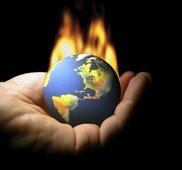 With the price of carbon credits continuing to slide in the global markets and the first commitment period for the Clean Development Mechanism (CDM, under which carbon trading is permitted) coming to an end this year, companies and investors holding carbon credits are worried at the prospect for investments in this regard.
With the price of carbon credits continuing to slide in the global markets and the first commitment period for the Clean Development Mechanism (CDM, under which carbon trading is permitted) coming to an end this year, companies and investors holding carbon credits are worried at the prospect for investments in this regard.
"Investors are worried.
"No transaction is happening in the global carbon market.
"The prices have come to below a dollar and no one (holding a carbon credit) is willing to exit the market.
"The negative sentiments can affect new green project registrations as well. When the carbon prices are too low, then companies and investors would not like to venture there," said a partner with a leading consultancy firm.
One carbon credit point is issued against every tonne of carbon dioxide emission the project avoids.
For earning the credits, companies have to register their projects with the United Nations Framework Convention on Climate Change.
Carbon offset credits have fallen to a new all-time low amid oversupply and signs of a possible ban on some credits in the European Union system.
The price of one carbon credit, nearly Euro 24 (Rs 1,500) in 2008, was Euro 0.83 on Thursday.
According to Seema Arora, executive director, CII-ITC Centre of Excellence for Sustainability Development, "Many Indian companies had sold their carbon credits before the Durban talks (UN Climate Change Conference, December 2011).
After Durban, Europe, one of the major buyers, put a brake on purchase of green credits, citing recession and a financial crisis.
"Indian firms are holding on to the remaining credit points with the hope that the market would rebound."
After the talks at Durban, Indian industry hoped it would gain from an extension of the Kyoto Protocol (to the UNFCC, setting binding obligations on industrialised countries to reduce their emissions of greenhouse gases by 2012).
But the carbon market continued to remain in the red after December 2011.
Major
In the private sector, Reliance Industries and ITC are among the holders.
"A robust global carbon market is essential to incentivise innovation and, to that extent, a more buoyant carbon market is desirable," an ITC spokesperson said.
"At ITC, we do not necessarily look at carbon credits only as a way of financing projects, or as a source of cash flow.
"We have earned carbon credits in several projects, including hotels and social forestry," he added.
Some consultants in the segment such as Noble, First Climate and Gensol reduced their carbon credit market-related activity this year.
KPMG, which offers advisory and consultancy services to companies on their climate change and sustainability initiatives, had its 'success fee' (or the advisory charges paid on the success of CER trading) come down in April.
However, there is a glimmer of hope. According to K Srinivas, founder and CEO of Vasudha Foundation, a charitable trust in the area of clean energy, "Though some private investors are shying away from green projects, it is unlikely to affect the growth momentum of green and clean energy projects in India.
In India, most clean projects are policy-driven.
"For example, the Gujarat government has a different solar mission policy, the Tamil Nadu government has a different clean energy project.
Therefore, it is unlikely that without any global finance, the projects would collapse."
As of November 2011, India had 2,123 approved CDM projects. Of these, 738 were registered with the UNFCCC, according to data from Ficci, the business chamber.
From fresh data, experts say the number could now be well over 1,000.
Till last month, the UNFCC had registered 5,000 projects under CDM and issued a little over a billion CDM credits.











